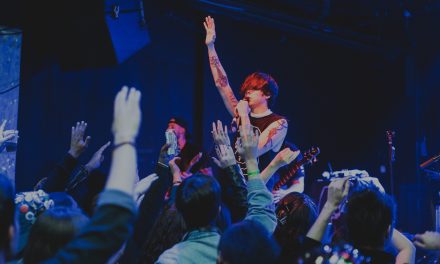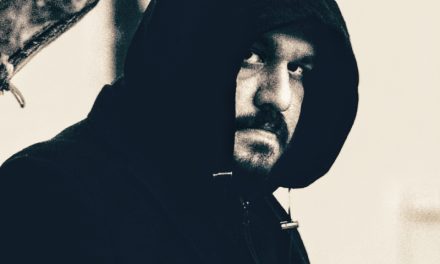
The Omnipresent Tommy Denander and The Reset of Radioactive
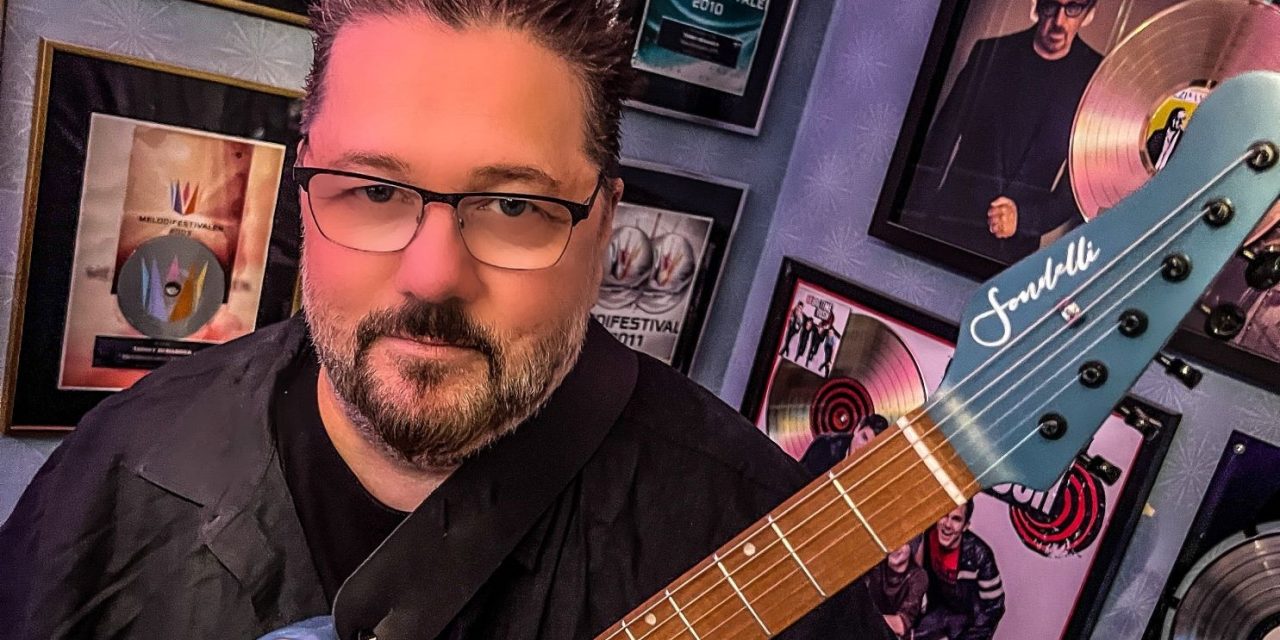
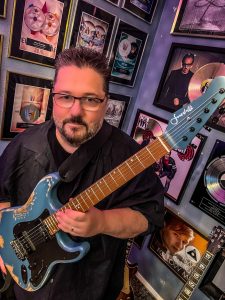
Tommy Denander photo by Marty Punch
The Omnipresent Tommy Denander and The Reset of Radioactive
Swedish guitarist/songwriter/producer Tommy Denander is a musician of 1000 credits – over 3000 actually, and his appearances have been on some of the most legendary hard rock / melodic rock albums in the genre. Denander has worked with artists including Michael Jackson, Paul Stanley, Alice Cooper, Deep Purple, Ricky Martin, Jeff Beck, Rob Zombie, Vince Gill, Ke$ha, Steve Perry, Ace Frehley, and many more.
Radioactive is a long running project from the maestro Denander, kicking off in the early 90’s with the auditory support of several esteemed members of Toto. And now as 2024 spins to its conclusion, Dedander’s Radioactive present Reset! The sixth magnum opus from the Radioactive treasury, Reset will be available October 11th via Frontiers Music Srl!
Highwire Daze recently interviewed Tommy Denander to discuss the making of Reset, his days on the Sunset Strip in the 80’s, the various hard to find releases Pride & Joy Music has been reissuing, his ongoing work with Frédéric Slama’s AOR endeavor, and a whole lot more! Read on…
What was it like to live in Los Angeles back in 1987? Do you visit here often?
I loved living there. I moved there in ’87. I was 19 years old. It’s in the end of the magic 80s. I lived on Fuller and Hollywood Boulevard. So, I was like next to La Brea. I was like a minute walk from La Brea and Hollywood. So, it was truly in the heart of Hollywood. My neighbor, when we opened our apartment door, and the one facing us in the hallway was Vince Neil’s wife at the time, she was living there. So, Vince was there all the time, and we were hanging out and Mötley Crüe used to have their band meetings in that apartment. My favorite memory is watching the sunset from the balcony over LA and hearing the roaring sound of four Harley Davidsons and it’s Mötley Crüe looking like the video Girls, Girls, Girls – and they’re coming into the garage and they’re having their band meetings. I was pretty good friends with Tommy Lee for a while as well.
Back then it was like in every corner of every street, there was a rock bar, a rock club. The Sunset Strip was just magical. It was just music everywhere. It was like the best time ever to be in LA being 19. Plus, I wasn’t into drugs, I wasn’t into drinking or anything. I was never partying that hard, meaning I just had a great time being out all the time at these clubs. The kind of background I have as a musician, I was equally a big fan of the total scene, the jazz rock scene and all of that. So, I was hanging at The Baked Potato all the time, as much as I was a Kiss, Van Halen, Metalhead. I was also hanging at The Rainbow and The Whisky. So, for me, it was a dream and all the way up until ’92. When the Rodney King riots happened and the music changed, the fun 80s just died very quickly, and LA was almost like a war zone. It just felt like I should probably go home for a while. I came back home. I met a girl, I ended up being a living with for four years and everything. It just felt like the right time to go back.
But I couldn’t be more thrilled about having lived in LA during those years. I had built a second home and an enormous amount of great friends in and out of the music industry. So, I’ve been back something like 120 to 150 times. Over years and years and years, I went four or five, six times a year, mostly to do work, the better the career went, the more work I did. I had such a good place to work. So, I kept going for songwriting for sessions for all kinds of things, even vacations stuff like that. So, then my daughter, who’s turning nine tomorrow, when she was born, I decided that I didn’t want to travel as much. I wanted to really be home, watch her grow up, and everything now we’re talking about within a year, that it would be fun to start going to the States on vacations with the family. So, I’m going to be back to LA for sure.
We could do a whole interview talking about a Sunset Strip era in 1987. But yes, let’s move on to Radioactive.
We’ll do a separate whole episode about that later for another issue for sure.
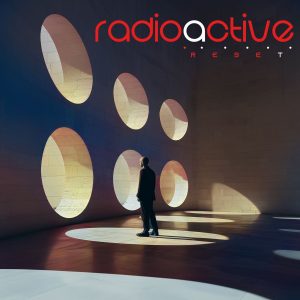
Reset by Radioactive
Let’s talk about the first Radioactive album first. What was it like having members of Toto on the first Radioactive album?
Magical! I was a Toto fan since 1978. I bought the first album that week it came out. It became my favorite band, my favorite musicians and all of that. So I saw them in 82 and 86 and 87, 88, a lot of these years’ tours and all of that. But when I moved to LA, it was like, probably highest on my bucket list to meet them and get to know them. Because I was a studio musician, and I love Toto. Luckily, a very famous Swedish journalist called me when I had moved to LA and said, if you can track down the guys in Toto, I would love to interview them in LA about their new album, The Seventh One, for a TV show I’m doing before they come. So, I knew I was going to go to The NAMM Show. I had the perfect opportunity to walk up to Steve Lukather and said, “Hi, my name is Tommy from Sweden. I need your help to set up a big TV interview for Sweden.” He went, “Cool. Here’s my number.” I set it up and everything. The interview turned out great. You can actually see it on YouTube. There’s an interview with Toto, and in rehearsal for the tour they’re doing, they’re playing the song, The Seventh One, which was a bonus track on the album. That’s the interview I set up.
About a week after that interview, I’m at a music store called Valley Arts in the Valley. I see Jeff Porcaro, and my legs are shaking. I’m like, My God, and I walk up to him and say, Hi, I’m Tommy. I’m from Sweden and I’m just the biggest fan. He goes, “Are you the Tommy who set up the TV interview?” I’m like, “Huh?” I get this jaw dropping. I went, “Yes.” He gives me a hug and goes, “Man, I can’t thank you for that. That was such a cool interview. Man, beautiful. You know what? Do you have my number?” I’m like, “No.” He’s writing down his number. “I think, man, we got to hang. So, tell me about you.” Jeff was the coolest guy ever. So he and I hit it off instantly. We ended up hanging with Mike Porcaro. The three of us just became enormously good friends. It was never even really on my radar, the idea of having the Toto guys play on anything I did, because I wasn’t really doing albums in that way. I was just happy being a very good friend. Always traveling with them on tours and hanging all the time. I mean, going to their places for barbecues and all that. We just became really good friends.
I was in a band during ’89 and ’90 here in Sweden. I wrote all the songs and everything. The band broke up. I just said they’re my songs. I’m taking them with me. This was early ’91. That summer, Toto did a short tour in Europe to play festivals. It was during the recording of Kingdom Of Desire. They played a show in Sweden. So, I went there, and in the morning after the show, we’re all sitting in the reception of the hotel. I just hear myself saying, at I’m at the same second as I’m thinking it, “guys, if I get a record deal, would you play on my album?” Before anyone answered it, I hear myself thinking, “Did I say that out loud? Or was it just like, did I think it?” Then Jeff just looked at me and went; “of course we would.” I’m like, “okay, cool.” It goes back to being silent again. I’m still thinking, “Did I ask you?” The answer is, it’s too surreal to get a grasp of the situation. So Jeff says, “Tommy, come here.” We walk over to the reception. He grabs a pen and paper. This is before the Internet and all of that. So he walks around. It’s just me and the whole band sitting in the reception. So he walks around. Everyone in the band says, “Write down the best number for Tommy to reach you so we can help him set this up.” Jeff just said, “Get a record deal somehow and call me. We’ll play on your album.”
Ten minutes later, I see a guy from Sony Records that I know really well. So being a good opportunist, I walk up to him with this paper with all the numbers and say, “Hey, if you sign me, the Toto guys” that he also adored, “they will play on my album.” He went, “What?” I showed him the paper and he said “Okay, come and see me on Monday.” I’m like, this is pretty cool. So on the flight from that place up in the north of Stockholm in Sweden, down to Stockholm, he was on the flight with Toto. He asked the guys, “Is this for real?” The guys said, “Sign him and we’ll play on the album. Let’s make this happen.” So I got there the week right after that weekend. I had a contract on the table before they even heard anything. So, October ’91, I’m in L.A. up in Calabasas recording the first Radioactive with Jeff, Mike, Steve Porcaro and David Paich as my backing band. I’m producing Toto. I’m 23 years old, so it cannot really get more surrealistic than that. It was the best time ever.

Tommy Denander
Sadly, when I got back home and I had recorded what became the first Radioactive, the guy at Sony had left and the new guy wasn’t that interested in some rock dude with a guitar recording with these old dinosaurs called Toto. He wasn’t into it at all. He was like, “We’re going to release this because we have to, but we’re not going to work on it. We’re not going to do anything.” I felt like I waited my whole life to get to this point to do this. So I ended up taking a bank loan and I bought the album back from Sony. After that, it took me 10 years to finish it. Luckily, because I managed to get Bobby Kimball and Fergie Frederiksen and Joseph Williams to sing on it and Fee Waybill from The Tubes and David Foster and all of these amazing players. So it ended up being a much cooler album. It was finally released in 2001 and did really well over the whole world.
It was back in the day when you could still sell some records. So, for me, it was a once-in-a-lifetime thing. I always said this – is I’ll do one of these and that’s it. Now I’m happy. Then the record label said, “So what are you going to do for the follow up?” I went, “What are you talking about?” It was like, “This one did really good and it put you on the map. So what are you going to do for next one?” I can’t do another one. I mean, by the time I had released it, Jeff Porcaro had passed away. It was a different world and everything. So, it was like, wow. But I decided to keep doing them. Here we are, maybe 33 years later after the first. releasing the sixth one coming out now in October.
Yes, the sixth radioactive album titled Reset. Is there any overall story or concept behind that title Reset? Can you believe you made it to six albums?
It’s freaky, and I have to give first of all, a big thanks to Frontiers. They offered me a deal after the first album. I was signed to a German label called MTM at the time. We did the first one and it was good. I was offered a deal by Frontiers back then. That was a really nice deal. I wanted to take it. So I told them like, I’m going to do this. They said, “You can’t because we have an option for another one.’ I went, “What?” I said, “Then you at least you have to match the budget, the deal, you know.” So they did. But we were talking already back then about doing this. So, after the first three albums I did, there was a break for 10 years and I got an offer from another label Escape to do the fourth one. I did. I think it became a really good album. It did really well. So that was kind of the start of this later year chapter in my life. This is when Frontiers came and said, “Why don’t we do a deal for like, let’s make four new albums in eight years. Let’s do one every other year and start building this again.” I said, “You know what? I feel this is perfect. This is the timing is perfect!” So this is why we’re you know, there will be another one after this in two years and another one after that. Hopefully if it goes well, we can keep doing them. So this is why we at least started doing more of them. I’m happy about it.
The story about the title Reset – it’s two stories in one. When I did the last album called X.X.X., which stands for 30, because it was the 30th anniversary of starting Radioactive. My frame of mind for writing music was closer to maybe classic rock, almost AC/DC, Van Halen-ish – not some so much traditional melodic rock, even though it has flavors of it. The reviews and the feedback from so many friends and fans were, it’s a really good album, but I kind of missed that sound that you had like on the first album. I kept reading that everywhere. I went, okay, I never do albums to please anyone else. I have to do what feels good for me. But it just felt like, maybe I should go back and see if I’m capable to write something that sounds like what I did on the first one. Because again, I wrote those songs in ’88 and ’89, when I was 21, 22 years old, and I’m 56.
Now it’s different world. It’s almost 35 years later. It’s like, can you actually go back and do that? So, I instantly felt like, wow, I’m actually finding the feeling for a sound that’s pretty close and an updated version of who I was back then. Then about a year and a half ago, I got a song from one of my closest friends and my mentor, Mutt Lange, the legendary producer, he just sent me this song on email. It was actually a pop song. It was just a little drum loop, some synth pads, and him singing. It was just a beautiful song. I said, “What’s this?” He goes, “It’s just a song. Meaning if I have any use for it, or anyone else, it’s a song that’s not being used. If you want to use it.” I’m like, “Cool.” It was sitting there for a long time. It’s probably almost two years ago. I wasn’t I wasn’t really thinking about doing it for Radioactive. Then it just, I listened to it, and I heard it, how I wanted to do it in a way that would fit this album. So I did a version of it, actually got all the separate files with his vocals and everything. I did my version, I sent it to Mutt, and he went, “This is really, really cool. I love this.” I went, “This is actually going to be pretty cool.” While I was working on the different ideas for titles, and the artwork and this and that, it just hit me that Reset – the story of that song that that he and another friend Tony wrote, is that we should Reset this whole planet. It’s too negative. It’s just too polarized. It’s not a happy feeling on Earth anymore, we should Reset the planet and go back, which is kind of what I did with the music. So it felt like it’s a perfect title for this album, that I’m resetting my sound to the early Radioactive sound. I have this song, which is also about resetting the planet. So it is a purpose behind the title and why it ended up being what it is.
You have lots of famous singers on your albums. I wanted to talk about the one that I don’t know, Harris Dio Zindani. What’s his background? Where did you discover Harris?
Good question, and it’s rare. It’s not something that I’ve done a lot because it’s always been sort of an all-star pro project in that way. But I heard him on these YouTube shorts or something like that. I saw a video of somebody singing like a Journey song, like a karaoke version on a short video, and I was completely blown away. I’m like, “Who’s this guy?” You know how it is, you watch one video, and the algorithms will give you more of the same thing. So, all of a sudden, there’s a Michael Bolton song coming in. Now he’s sounding like Michael Bolton, and as good as him, I’m like, “Who is this guy?” So he goes from Steve Perry to Michael Bolton. Then all of a sudden, it’s Bryan Adams. Then it’s a Toto song. I’m like, I’m freaking out. I managed to track this guy down. Turns out he’s like the nicest guy living in Dubai with his family and making his living working as a singer at the Hard Rock Cafe in Dubai. He used these backing tracks and he sings live. That’s what he’s doing. I just felt, My God! I showed him to Frontiers, they freaked out and said we need to do you need to do an album with this guy. I’m like, absolutely. But we should introduce him on Radioactive first, and then like, build an album. So that is the plan.
He did a great job singing on the on the song Midnight Train. I’ve never been a singer. I’ve done a little backing vocals myself over the years. But that’s it, in the in my 40-year career, I’ve never sang lead on anything. I don’t know what possessed me to think that I could do it. But for some reason, while working on the songs for this album, I did the demo vocals to send to singers, which is something I normally do. That song sort of fit my little range of singing. I went, maybe I should introduce him on the first half. Actually, as a fun thing, if it turns out, okay, sing the second half of it. So it took me a few weeks to like really work on it and put it together to make it sound good enough to where I could be part of a lead vocal. But again, he is truly the star of that song. For sure, somebody that you’re going to hear a lot more from in the future.

Cut In Ice Revisited by Tommy Denander (Pride & Joy Music)
I want to switch over to Pride & Joy Music. What has it been like to have this explosion of releases on Pride & Joy from various points in your career?
Very, very cool. First of all, I love Birgitt Schwanke who is running it. I was going through all of these releases. I have albums I’ve done over the years that people loved, and they sold pretty good way, way back. I basically had just put them on the digital platforms. Me and Birgitt started talking about that they had this idea of doing a section of the record label where they would release old albums in like 500 copies and this and that. I said, “You know what? I have I have a bunch of cool albums that I would love to, I would remaster them and I’ll do new artwork and just update them as much as I can.” So we did that. We did a couple and they sold really well. So, we did a few more and we did a few more.
The last one I did was, I took the first album I did in my whole life. The one that I got my first record deal was a Swedish hard rock band called ATC. We did an album 40 years ago called Cut In Ice. I was listening to it and going like the full circle of 40 years. I’m like, I should rerecord this album, like really note for note do it. Because what I heard was that the songs were really good. But I mean, we were 14, 15-year-old kids when we did it. So, it’s like, they would probably sound pretty cool if we do it now. So, in a week, I just redid it with a singer friend and a drummer and me playing everything else, did new artwork that sort of pays tribute and all of that. Apparently, from what I’ve been told, it’s sold out instantly. I don’t think I have any other old unreleased albums sitting anymore. But we will for sure do more stuff together on Pride & Joy. It’s a very, cool label they’re running and a good online store. They have everything. So, it’s a good place.
You’ve also done work with Frédéric Slama’s AOR project on many, many of his various albums, including last year’s Bewitched in LA. How did you become involved with that? Because he’s doing something similar to what you do in Radioactive.
He is by far the person I have done most albums for in my whole career. We’re just going into mixing on the new one, which we both feel is probably the best one we’ve done so far. I think it’s album 24 we’ve done together for AOR. It’s insane how many albums we’ve done together.
Speaking of 500 albums or 2000 albums or whatever it is for you, is there a comprehensive list anywhere of all the albums you participated on throughout the years?
I stopped counting at 3000. That was a few years ago. It’s probably up to like 3200 or 3300, something like that. That’s just albums. Then we don’t even go into all the singles and movies and all of this. It’s an insane list over 40 years. That is crazy. There used to be a Wikipedia page where there were at least a couple of thousand listings. But it was also a fun list because it was like I put every version of every album, like if there were 27 versions of an Alice Cooper album, I would encourage people to put every different version. If there were bootlegs, it was like it was just cool to see this. Then there was some guy working for Wikipedia said this is against Wikipedia rules. You cannot do a list like this. We are going to delete it. I’m like, in what way does it bother anyone that somebody wants to do like the most complete list of everything? I’m like, okay, whatever. So I just saved a copy of it. I had a website for a short while where I had it on. But I had no use for a website. I would say the best way to really get an idea of most of the big work that I’ve done, and it’s a list of something like twelve, thirteen hundred songs would be I have a Spotify list that I think is called Tommy Denander Work. So if you search on Spotify for playlists, you’ll find my main work list. It has all the all the big ones and every new song coming out. But a lot of the work that I did during the 80s and 90s never ended up on digital platforms, which is fine. A lot of it wasn’t that good. It’s like most of the early work was just you’re a B-level, B-level at best, usually a C-level studio musician because you’re young, you’re not doing the total work, you’re not doing the A-list work in Sweden. There’s like the occasional fine album and then there’s just a lot of like could be good sounding, could be nice album, but it’s not like something you run around with today and like you want to show to people. So as much as the better work is in the last, I would say maybe 15 years and most of that is on Spotify.

Tommy Denander via Zoom!
The new Radioactive album is about to come out. What’s up next for you after this album is out?
I am finishing the new AOR album. We just started mixing it. So that’s soon done. I am producing a singer that’s been part of Radioactive and also the Steve Walsh album called Jerome Maza. I’m producing his new album. I just finished writing all the music. We’re doing the melody and lyrics right now. That one feels like it’s going to be a monster. We’re both extremely excited about it. It just came together so well. So that one is really cool. I did just produce three singles for a very cool band in Sweden called Black Paisley. I’m just now producing the lead singer’s solo album. His name is Stefan Blomqvist. So, I’m doing that right now.
There’s a million guitar sessions and songwriting things going on all the time. This year has been, it feels like the 80s. For real, I’ve had five days off since January 2nd and its September 17th today and those five days were because we went away for five days during the summer on vacation. I’ve been working every single day since January 2nd and it’s a luxury problem to have this much work in 2024. But it’s been a good year.
I had my third number one on Billboard with Ace Frehley. Ace Frehley is the reason why I started playing guitar, so that was a big one. It’s just been an enormously productive and fun year. I’m booked for half of next year already, so it looks like it’s going to keep going for a while. I couldn’t be happier.
(Interview by Ken Morton)
Tommy Denander on Facebook










